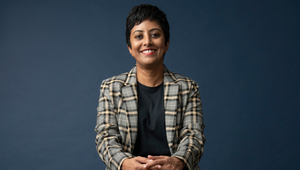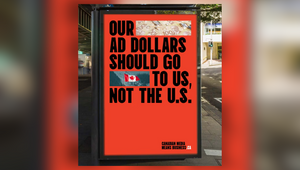
How London-Flavoured VFX Became a Global Delicacy

What do the ad industry’s big international VFX companies have in common? Businesses like Framestore, MPC, The Mill, Glassworks, Smoke & Mirrors and Electric Theatre Collective? While each of those brands feels and operates very differently – and they’d gladly talk you through their proprietary processes and the edge that differentiates them. But they all have one thing that ties them together – they may have a global footprint, but they started off life in London.
Over the course of the past few decades London’s once cottage industry of post production has looked outwards and persistently succeeded, gradually building itself into dominance. But it wasn’t destined for success from the start. The VFX industry’s story began in markets that made more sense - those with large filmmaking industries like the USA or pioneering technology companies like Japan at the dawn of the video age. But as the landscape shifted over the decades and many companies have collapsed under their own weight in the turmoil, a surprising number of British-born post houses have stood strong, expanding to continue leading the world with quality visual effects. “The world changed,” says Framestore CEO Sir William Sargent, an Irishman who set up a post production company in London that went on to span the globe. “The British companies evolved with it and have prospered. Whereas many [post houses] have come and gone in America, what’s emerged is that the British companies have ridden the globalisation of the industry.”
British VFX sprang from patch of fertile ground - that ancient, often overcast city that the British post production scene emerged from. London, and more specifically the square mile of Soho in its West End, is the most concentrated nexus for this global cultural relevance. When the first of today’s big VFX shops opened, they all did so within a 10 minute walk of each other, embedded in a neighbourhood that had been inspiring the world through art and creative commerce for decades. “You had the early music business in the late ‘50s and theatre before that, all in Soho. Advertising came into the same space. Film was being made in the same space,” says Sir William. “You were literally talking about a square mile in which the creative industries were concentrated for 75 years. When you were attracted to come into the creative industries for business or looking for a job, if you headed for Soho you had a pretty decent chance of being at the centre of world creativity. The British are naturally globalist in their horizons.”
The Mill London’s managing director, Sean Costelloe, calls his city’s soul “a pioneering and restless spirit to be the very best in the world at what we do.”
The Moving Picture Company (now usually known as MPC) started as a straight-up production company in 1970. Now a world-spanning VFX network, Jonathan Davies, its managing director, reflects on the impact London’s strong creative foundations had on the business: “It was built on the wave of a very successful creative and advertising industry in London - a very unique ecosystem.”
In post production, though, when the first houses started doing VFX in Soho in the ‘80s, London’s creative heritage was missing something that would have made business go much more smoothly - a thriving film and television industry. “We were fundamentally insecure,” remembers Sir William. “We didn’t have robust film and television markets 30 years ago.”
This made London’s post houses lean and mean. Without the warm, supportive cushion of a large industry to rest on, they had to take whatever scraps of work they could get. Sir William describes this mentality as “not taking anything for granted, being generalists and working across genres. It’s the nature of needing to be lean and multi-disciplined, and needing to turn your hand to whatever form of filmmaking you could get a job in that week. Whereas in America there was a large film industry that you went to work in, a large television industry, a large advertising industry. You could be a specialist there.”
Soho’s early VFX houses worked hard to win whatever work they could, fighting in close quarters. “I think that the cluster was important because it meant that we were very competitive with one another,” says Sir William. Jonathan describes the community as still having an “amazing creative skillset, ferocious competitive nature, and less reliant on sleep.”
It was this spirit that Hector Macleod, founder and CEO of Glassworks, established his post house in 1995. “London was dominated by large, traditional, inflexible post production companies,” as he saw it. “Glassworks was set up to contrast this using open architecture technologies with a focus on artistically talented operators, backed up with strong technical IT and R&D support.” In the ‘90s and ‘00s the work ethic that the London VFX scene had got used to was extraordinary. “Literally, the blood sweat, and tears put into projects did create outstanding results,” Hector says.
Also founded in 1995 was Smoke & Mirrors – a creatively-led shop set up by five talents deliberately leaning into the spirit of the boutique.
By the time Electric Theatre Collective set up shop in 2011, the British post community had made an impact that had changed the way visual effects worked around the world. “Hitchcock, Kubrick and Lucas all worked in the UK with British talent,” says Giles Cheetham, VFX artist and partner at ETC. “And then DNEG producing Oscar-winning VFX for the last decade, this has further cemented the reputation of the high-class artistry that is found in the UK.”
It wasn’t long until clients wanted what London’s post houses had to offer – but in other parts of the world. The Mill didn’t have any grand plan to open its second office in New York, becoming the first VFX company to do so, but Sean explains that circumstances demanded it. “After 9/11 our clients in the US didn’t want to travel,” he says. In 2002 the company was up and running in the USA.
2004 saw Framestore open its first satellite office in New York City, to service the advertising agencies there. MPC followed suit in 2008, becoming a transatlantic network with the addition of a Los Angeles office, “to provide a powerful creative alternative for LA and US based advertisers and commercial production companies,” says Jonathan.
For Glassworks, expansion went east rather than west (but not too far – to Amsterdam). And it was talent, rather than clients, that drove this. Hector reflects on the rules his company set for expansion: “No more than a two-hour flight away. Quality of life had to be an easy sell to potential staff, English being widely spoken and some knowledge of local agencies and production companies. Once we applied these rules to our decision-making process Amsterdam was a clear winner.”
London-style VFX had taken off internationally. Before by the end of the ‘00s, several global post networks were run from UK HQs, now straddling time zones and drawing on the creative-technical expertise that VFX wizardry needs from the four corners of the world. MPC’s 3,000 employees are today spread across London, Paris, Amsterdam, New York, Los Angeles, Shanghai and Bangalore. The Mill is in London, New York, Los Angeles, Chicago and Bangalore. Framestore’s 2,500-odd employees are based in London, Montreal, New York, Los Angeles, Chicago and Pune. Glasswork’s three-office network includes the experiential Xavi’s Lab, born in Barcelona, and Glassworks W1 – a division that creates haptic and immersive learning tools. Smoke & Mirrors has 350 employees across London, New York, Amsterdam, Shanghai, Bangkok, Mexico City and Sao Paulo. Electric Theatre Collective, now seven years in business, has grown its Los Angeles office to almost the size of its London ‘mothership’.
These companies that grew up around UK advertising also expanded their presence in the movie industry. In 2001, The Mill was the first UK company to win a VFX Oscar for its work in Gladiator – a game changer. These days British-headquartered VFX companies are a regular presence in huge blockbusters, from MPC’s boundary-pushing work on The Jungle Book and the upcoming Lion King to Framestore’s influence on the Marvel superhero franchise and family favourites like Paddington and Mary Poppins Returns. The Mill is set to return to the movies with a new studio in Adelaide, which was announced last year.
The spirit of London permeates these companies and continues to fuel the sorcery they bring to our screens. Sir William feels that their hometown is still important to their identities: “In our case, and certainly [in the case of] the other well-regarded global players, the leadership, founders, culture and way of doing business has fed outwards. Those companies have remained led out of the UK even when the majority of their staff are in other countries.”
Giles seconds this: “The UK is still a big driver for talent and technique. It’s still the mothership for Electric – three of the four partners are still in London. The UK market is still one of the most creative markets in the world: agile, inclusive, open minded with a point of view.”
“When Glassworks set up in London 25 years ago it really was the city where the best VFX in the world was being produced,” reflects Hector. “This made the UK market an extremely competitive and demanding place to succeed. The passion and energy required to be successful in this market exported very well into other cities. The challenge is maintaining this legacy in all offices. This is why our rule of no office being further than a two-hour flight away works well.”
There is, for British-run global businesses in 2019, a serious issue to wrestle with. “The big elephant in the room is Brexit,” concedes Hector. “And though we are all in the dark regarding the outcome having, two European offices should be beneficial.” The same goes for the British-born networks more broadly, who are hoping to weather the uncertainty through keeping various baskets open to their various eggs.
“Today, as the industry is tested by ever decreasing schedules and budgets, those heady days [of London’s initial VFX boom] do seem far away,” says Sean. “But I still think that the London market is special mainly because of that legacy.”
“I feel that building a business from the UK outwards is a good thing to do,” says Sir William. “We certainly don’t take anything for granted. Which is a feature of the creative industries going back 75 years. You’re only as good as your last song, film or commercial. We’ve learnt that a certain humility has served us well over a long time. Things come around, as they say. I don’t take for granted the fact that as a community we’ve been successful on a global basis.”















